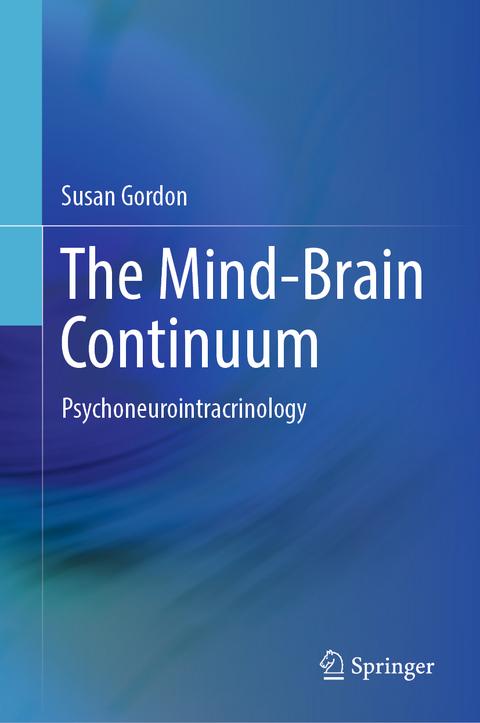
The Mind-Brain Continuum
Springer International Publishing (Verlag)
978-3-031-10058-1 (ISBN)
This insightful book proposes a holistic theory of the development of self, drawing on interdisciplinary literature in existential-phenomenology, neurophenomenology, intracrinology, endocrinology, and naturopathic medicine. The psychoneurointracrine hypothesis bridges the gap between the mind and brain, providing a framework to explain the complex system that facilitates development of one's sense of self and well-being. The book challenges assumptions in present day neuroscience and psychiatry, placing the mind and brain on a continuum of health and growth rather than reducing the study of human consciousness to neurobiological terms and pathological classifications.
"In this landmark book, Susan Gordon presents a bold hypothesis, one that underscores the importance of psychoneurointracrine activity and links it to female neurology and the development of one's sense of self. She brilliantly places this activity, which serves as a mind-body bridge, within the frameworks of neurophenomenology and non-linear dynamics. Her psychoneurointracrine hypothesis is a tour de force, one that is holistic, integrating intracrinology with psychology and neurology. This hypothesis undercuts the current assumption that the mind is an epiphenomenon of the brain, creating a paradigm that impacts science's understanding of behavior, experience, consciousness, and human agency."
Stanley Krippner, PhD, Affiliated Distinguished Faculty, California Institute of Integral Studies, San Francisco, CA
"In her fascinating book, Susan Gordon develops a novel theory about the biological connection between mind, brain, and organism. Drawing on empirical research on the role of the female hormonal system in basal states of self and mood, she shows that the biochemistry of the endocrine system must be viewed as an indispensable foundation for the emergence of embodied self-awareness. The homeostasis and hormonal balance of the organism is integral to the sense of well-being and the development of meaning, but it is also continually modulated and influenced by the subject's experience of his or her world. In this way, she makes a decisive contribution to a theory of embodiment that goes far beyond a computational theory of the brain to focus on the biochemical-organismic processes at the root of the mind."
Thomas Fuchs, MD, PhD, Karl Jaspers Professor of Philosophy and Psychiatry, University of Heidelberg, DE
Susan Gordon, PhD is Core Adjunct Professor of Psychology at National University, La Jolla, CA and Research Director of the Southbury Clinic for Traditional Medicines, Southbury, CT. She has a doctorate in the History and Philosophy of Psychology (mind-body medicine) from Saybrook University and training in naturopathic medicine from Bastyr University. Dr. Gordon is an invited post-doctoral lecturer at L'Institut des Systemes Complexes Paris Ile-de-France and a Foreign Expert of the Bureau of Foreign Experts Affairs, Guangxi Province, PRC. Her research and publications integrate reproductive endocrinology, neurophenomenology, Asian and comparative philosophy, and mind-body medicine. Dr. Gordon is editor and contributing author of Neurophenomenology and Its Applications to Psychology (Springer, 2013), co-author of "Humanistic Neuropsychology: The Implications of Neurophenomenology for Psychology," In The Handbook of Humanistic Psychology: Leading Edges in Theory, Research, and Practice (Sage, 2015) and author of "Psycho-Neuro-Intracrinology: The Mind-Body Continuum," In The Healing Power of Nature: The Foundations of Naturopathic Medicine and the Ecology of Healing: Primary Care for the Twenty First Century (in review).
1. Neurobiological Reductionism and the Philosophy of Science.- 2. Holism and the Theory of Autopoiesis.- 3. Neurophenomenology, Enactive Cognition, and the Embodied Mind.- 4. Models of the Self.- 5. Self-Actualization.- 6. Neurobiological Transition in Women at Midlife.- 7. Intracrinology is Autopoietic.- 8. Psychoneurointracrine Hypothesis.- Implications for Psychiatry and Psychological Medicine.- 10. Conclusion.
| Erscheinungsdatum | 03.01.2023 |
|---|---|
| Zusatzinfo | XXVII, 196 p. 17 illus., 11 illus. in color. |
| Verlagsort | Cham |
| Sprache | englisch |
| Maße | 155 x 235 mm |
| Gewicht | 456 g |
| Themenwelt | Geisteswissenschaften ► Philosophie |
| Geisteswissenschaften ► Psychologie ► Allgemeine Psychologie | |
| Geisteswissenschaften ► Psychologie ► Psychoanalyse / Tiefenpsychologie | |
| Geisteswissenschaften ► Psychologie ► Verhaltenstherapie | |
| Schlagworte | Autopoiesis • clinical applications of the psychoneurointracrine hypothesis • consciousness of self • embodied cognition • enactive cognition and the embodied mind • existential phenomenology • hormonal changes in women at midlife • humanistic theory of self • mind-brain continuum • models of self-actualization • Naturopathic Medicine • Neurophenomenology • Psychoneurointracrinology |
| ISBN-10 | 3-031-10058-1 / 3031100581 |
| ISBN-13 | 978-3-031-10058-1 / 9783031100581 |
| Zustand | Neuware |
| Informationen gemäß Produktsicherheitsverordnung (GPSR) | |
| Haben Sie eine Frage zum Produkt? |
aus dem Bereich


